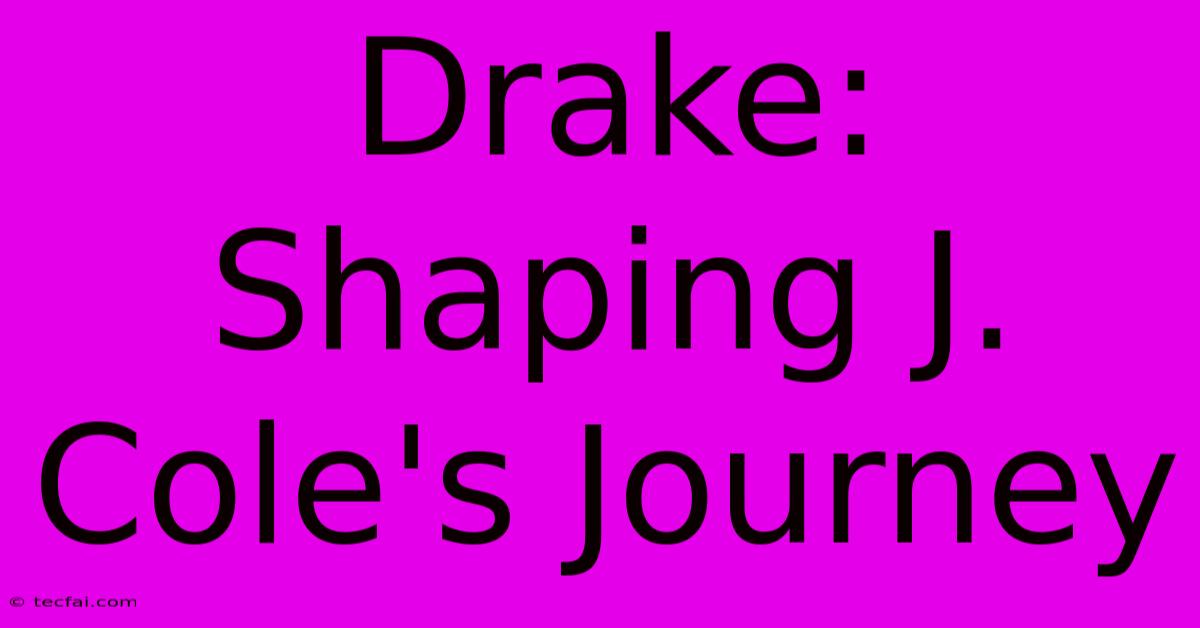Drake: Shaping J. Cole's Journey

Discover more detailed and exciting information on our website. Click the link below to start your adventure: Visit Best Website tecfai.com. Don't miss out!
Table of Contents
Drake: Shaping J. Cole's Journey
The intertwined careers of Drake and J. Cole are a fascinating study in hip-hop's evolution. While often positioned as rivals—a narrative fueled by competitive chart success and contrasting styles—a closer look reveals a more nuanced relationship. Drake's influence, both direct and indirect, has undeniably shaped J. Cole's journey to becoming one of hip-hop's most respected artists. This article explores the multifaceted ways Drake’s impact resonates within Cole’s artistry and career trajectory.
The Shared Landscape of Early Success
Both artists emerged in the early 2010s, a period defined by the rise of mixtape culture and the changing landscape of music distribution. Drake, already a major force with his So Far Gone mixtape, established a blueprint for success: authentic vulnerability mixed with undeniable charisma. This approach, blending introspective lyrics with catchy melodies, wasn't wholly original, but Drake perfected and popularized it. J. Cole, with his The Come Up mixtape, followed a similar path, showcasing his lyrical prowess alongside a more introspective and less overtly celebratory tone. This shared foundation, rooted in mixtape releases and a focus on honest storytelling, establishes an early connection between their paths.
The Influence of Vulnerable Storytelling
One key area where Drake's influence is undeniable is J. Cole's embrace of vulnerable storytelling. Drake's willingness to expose personal struggles and insecurities, a rarity in mainstream hip-hop at the time, created space for artists like Cole to follow suit. While Cole's narratives frequently tackle social issues and personal growth with a sharper lyrical edge than Drake's often more melancholic reflections, the foundation of emotional honesty is clearly a shared artistic pillar. This vulnerability resonated deeply with audiences, building a loyal fanbase for both artists.
Divergent Paths, Convergent Success
Despite their shared origins, Drake and Cole carved distinctly different paths. Drake's ascent was meteoric, fueled by major label backing and a relentless focus on chart domination. Cole, while achieving massive success, cultivated a more independent and artistically driven approach, often prioritizing critical acclaim over immediate commercial dominance. However, this divergence doesn’t negate the influence. Cole's consistent dedication to lyrical depth and thematic complexity, even amidst the rise of more commercially oriented trap sounds, could be seen as a direct response to – or perhaps even a rebellion against – the more commercially driven aspects of Drake's success. He demonstrated that commercial success and artistic integrity weren’t mutually exclusive.
The "Rivalry" Narrative: A Media Construct?
The persistent framing of their relationship as a "rivalry" is arguably a media construct. While the two haven't collaborated extensively, the lack of direct conflict suggests a healthy professional distance rather than outright animosity. The narrative likely serves to generate interest and hype, capitalizing on the natural comparison between two highly successful and influential artists. This highlights the complex interplay between artistic competition and media representation within the hip-hop industry.
Lasting Impact: A Legacy of Authenticity
In conclusion, Drake’s impact on J. Cole’s journey isn't about direct imitation. It's about a shared context, a demonstration of what’s possible, and a challenge to redefine the parameters of success within hip-hop. Drake’s popularity and success legitimized a more vulnerable, introspective approach to storytelling, creating space for Cole to flourish with his unique blend of lyrical complexity and personal narratives. Both artists have left an indelible mark on hip-hop, showcasing the multifaceted ways authenticity and artistic vision can shape a successful and impactful career. Their stories, though distinct, are interwoven, exemplifying the rich and complex tapestry of hip-hop's ongoing evolution.

Thank you for visiting our website wich cover about Drake: Shaping J. Cole's Journey. We hope the information provided has been useful to you. Feel free to contact us if you have any questions or need further assistance. See you next time and dont miss to bookmark.
Featured Posts
-
Live Na Performance Bruno Mars At Rose Sa Mewatch
Nov 23, 2024
-
Us Embassy Lockdown Police Respond
Nov 23, 2024
-
Mc Gregor Rape Case Jury Verdict
Nov 23, 2024
-
Fx Market Summary November 20 2024
Nov 23, 2024
-
1st Test Highlights Australia Vs India 2024
Nov 23, 2024
